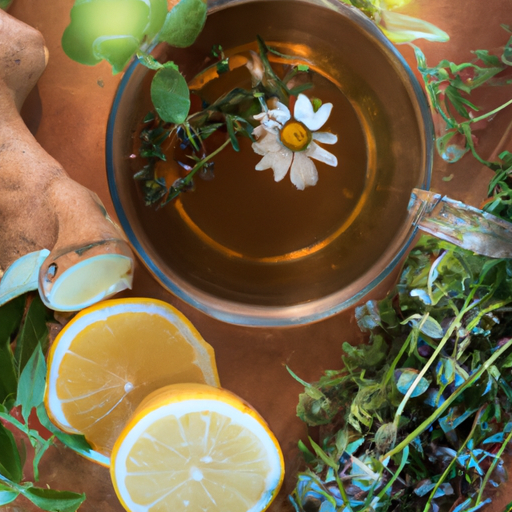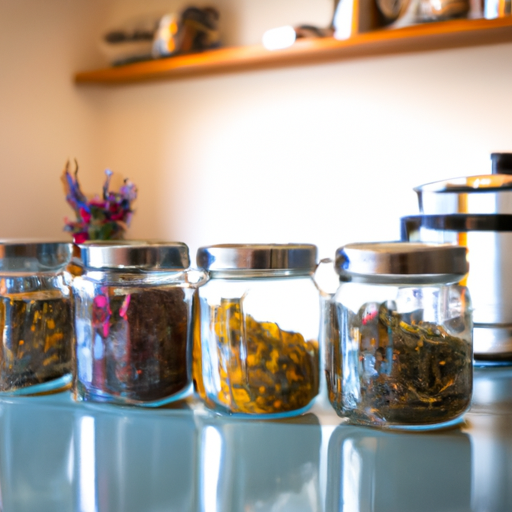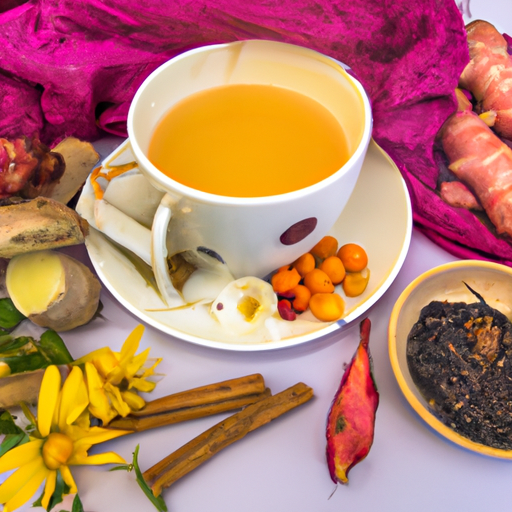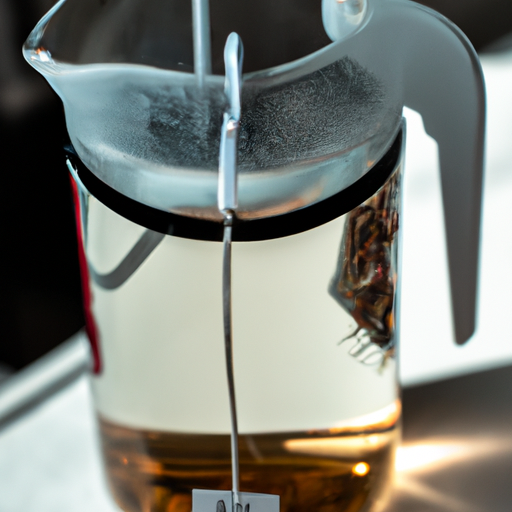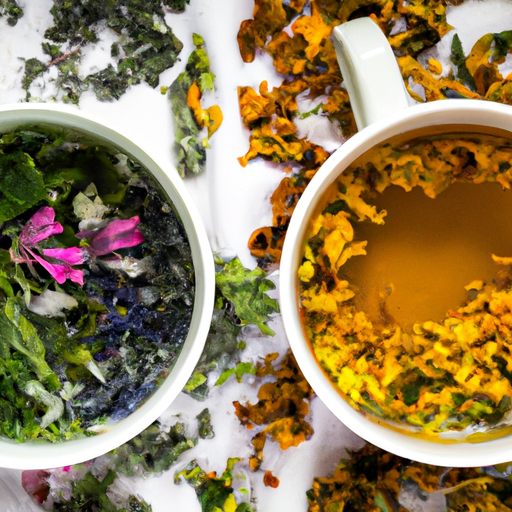As I sat curled up on the couch, sipping a steaming cup of herbal tea, I couldn’t help but marvel at the power of nature’s remedies. It was a cold winter’s day, and the relentless cough and congestion had taken hold of me. Desperate for relief, I turned to my trusted collection of herbs and spices, seeking solace in their healing properties. Little did I know that these humble ingredients would prove to be my saving grace.
Herbal tea has long been celebrated for its ability to soothe and comfort, and when it comes to coughs and colds, it becomes a potent elixir. By adding a few simple ingredients to my brew, I discovered a whole new level of relief.
Honey, with its antibacterial properties, eased my sore throat, while lemon provided a boost of vitamin C to bolster my immune system. Ginger, with its anti-inflammatory properties, helped to reduce the inflammation in my airways, providing much-needed relief from congestion.
In this article, I will explore the various ingredients that can be added to herbal tea to alleviate coughs and colds. From the soothing properties of cinnamon to the immune-boosting benefits of echinacea, we will delve into the world of natural remedies and uncover the secrets to finding comfort in a cup.
So grab your favorite mug, settle in, and let’s embark on a journey of healing and wellness.
Key Takeaways
- Echinacea can be added to herbal tea for cough and cold to boost the immune system and fight infections.
- Chamomile can be added to herbal tea for cough and cold to promote relaxation and improve sleep, which is important for recovery.
- Both echinacea and chamomile can address cold symptoms and promote overall well-being when added to herbal tea.
- It is important to consult a healthcare professional for personalized dosage guidance when adding echinacea to herbal tea for cough and cold.
Honey: Soothe a sore throat and provide antibacterial properties.
Adding a spoonful of honey to your herbal tea not only soothes a sore throat but also provides the added benefit of antibacterial properties, making it a comforting and effective remedy for cough and cold. Honey is a natural sweetener that’s been used for centuries due to its medicinal properties. It acts as a demulcent, forming a soothing coating on the throat and relieving irritation. Furthermore, honey is known to have antimicrobial properties, which can help fight off the bacteria causing the cough and cold symptoms.
If you prefer honey alternatives, you can try using maple syrup or agave nectar, which also provide soothing effects. When combined with herbal tea, honey and its alternatives offer a holistic approach to treating cough and cold, providing both relief and immune-boosting benefits.
Now, let’s move on to the next section about lemon, which can boost your immune system with vitamin C and add a refreshing flavor.
Lemon: Boost your immune system with vitamin C and add a refreshing flavor.
Enhance the taste of your brew while giving your immune system a boost by squeezing some zesty lemon into it. Adding lemon to herbal tea provides numerous benefits for overall health and wellness. Not only does it contain high levels of vitamin C, which can strengthen your immune system, but it also adds a refreshing flavor to your tea. Lemon is known for its antibacterial properties, which can help soothe a sore throat and fight off any infections.
To incorporate lemon into your herbal tea recipes for cough and cold relief, get creative! You can try adding lemon slices or wedges directly to your tea, or you can squeeze fresh lemon juice into your brew. Another option is to infuse your tea with lemon zest for a more intense citrus flavor. Whichever method you choose, the addition of lemon will provide a burst of flavor and an extra dose of immune-boosting vitamin C.
Now, let’s move on to ginger: reduce inflammation and relieve congestion.
Ginger: Reduce inflammation and relieve congestion.
Ginger, with its powerful anti-inflammatory properties, can help alleviate inflammation and provide relief from congestion. It has been used for centuries in traditional medicine to improve digestion and reduce nausea. Ginger contains compounds called gingerols, which’ve been shown to have anti-inflammatory and antioxidant effects.
These properties can help reduce inflammation in the respiratory tract and ease congestion. Additionally, ginger can enhance respiratory health by promoting the production of mucus and clearing the airways. When combined with other herbs like Echinacea, which’s known for its ability to enhance respiratory health and reduce cough symptoms, ginger can be a valuable addition to herbal tea for cough and cold.
As we transition into the subsequent section about peppermint, it’s worth noting that ginger pairs well with peppermint, as they both offer soothing and cooling sensations.
Peppermint: Clear your sinuses and provide a cooling sensation.
Are you ready to experience the refreshing and cooling sensation of peppermint that’ll instantly clear your sinuses? Peppermint tea, made from the leaves of the peppermint plant, has been used for centuries to provide relief from various ailments. When it comes to cough and cold, peppermint tea can be a great addition to your herbal tea blend.
Here are some benefits and uses of peppermint tea:
-
Relieves nasal congestion: The menthol present in peppermint helps to open up the airways and clear your sinuses, providing instant relief from congestion.
-
Soothes sore throat: Peppermint has a soothing effect on the throat, helping to reduce inflammation and alleviate discomfort.
-
Relieves cough: The anti-inflammatory properties of peppermint tea can help to reduce coughing and soothe irritated airways.
It’s important to note that while peppermint tea can be highly beneficial, it may not be suitable for everyone. Some individuals may experience side effects such as heartburn or allergic reactions. It’s always a good idea to consult with a healthcare professional before incorporating peppermint tea into your routine.
Now, let’s move on to the next section about turmeric, which can help fight inflammation and boost your immune system.
Turmeric: Fight inflammation and boost your immune system.
Boost your immune system and fight inflammation by incorporating turmeric into your routine. Did you know that turmeric has been used for centuries in traditional medicine and has over 6,000 peer-reviewed articles highlighting its health benefits?
Turmeric is a powerful spice that contains a compound called curcumin, which has been shown to have anti-inflammatory and antioxidant properties. This means that it can help reduce inflammation in the body and protect against oxidative damage caused by free radicals.
Adding turmeric to your herbal tea for cough and cold can provide an extra boost to your immune system while also soothing your symptoms. There are many ways to incorporate turmeric into your tea, such as mixing it with ginger, lemon, and honey for a soothing and immune-boosting blend. Try experimenting with different turmeric recipes to find the combination that works best for you.
Now, let’s move on to the next ingredient – cinnamon, which provides warmth and soothing properties.
Cinnamon: Provide warmth and soothing properties.
Cinnamon, with its comforting and soothing properties, adds a warm touch to your routine, making it the perfect addition to your wellness journey. When it comes to herbal teas for cough and cold, cinnamon offers numerous benefits.
Here are three reasons why you should consider adding cinnamon to your herbal tea:
-
Boosts immune system: Cinnamon is rich in antioxidants that help strengthen your immune system, making it more resilient to coughs and colds.
-
Relieves throat irritation: Cinnamon has natural anti-inflammatory properties that can help soothe a sore throat and reduce irritation.
-
Enhances flavor: Not only does cinnamon provide health benefits, but it also adds a delicious and aromatic flavor to your herbal tea.
However, it’s important to note that excessive consumption of cinnamon may have potential side effects such as liver damage or allergic reactions. It’s recommended to stick to a moderate dosage and consult with a healthcare professional if you have any concerns.
Now, let’s explore the next topic about echinacea and its ability to boost your immune system and reduce the duration of a cold.
Echinacea: Boost your immune system and reduce the duration of a cold.
Echinacea, known as the "immune system superhero," swoops in to fight off colds and reduce their duration, like a shield protecting against an army of germs. This powerful herb has been used for centuries to support the immune system and alleviate symptoms of the common cold.
Echinacea benefits include boosting the production of white blood cells, which help to combat infections and viruses. It also possesses anti-inflammatory properties that can reduce the severity of cold symptoms such as sore throat and congestion.
To reap the benefits of echinacea, it’s recommended to take it in the form of a tea or supplement. The dosage varies depending on the individual and the severity of the symptoms, so it’s best to consult with a healthcare professional for personalized guidance.
Now, let’s move on to the next ingredient, chamomile, which can promote relaxation and help with sleep.
Chamomile: Promote relaxation and help with sleep
Chamomile, with its soothing properties, can be a great aid in promoting relaxation and improving sleep quality. This herb has been used for centuries as a natural remedy for various ailments, including insomnia and anxiety. Chamomile tea is known for its mild sedative effects, which can help calm the mind and prepare the body for a restful sleep.
To understand the benefits of chamomile, let’s take a look at the table below:
| Benefits of Chamomile |
|---|
| Reduces anxiety |
| Improves sleep quality |
| Promotes relaxation |
Chamomile contains compounds such as apigenin, which acts on certain receptors in the brain to induce a feeling of relaxation. It also helps reduce anxiety by increasing the levels of serotonin and melatonin, neurotransmitters that regulate mood and sleep. By incorporating chamomile into your herbal tea for cough and cold, you not only address the symptoms but also promote overall relaxation and improve sleep, which are crucial for a speedy recovery.
Frequently Asked Questions
Is it safe to add all of these ingredients to herbal tea for cough and cold?
It’s safe to add a variety of ingredients to herbal tea for cough and cold. However, there are possible alternatives to herbal tea and the effectiveness of herbal tea varies from person to person.
Can I add multiple ingredients to my herbal tea for cough and cold?
Adding ginger to herbal tea for cough and cold can provide numerous benefits. Ginger has anti-inflammatory and antimicrobial properties that can help soothe a sore throat and reduce congestion. There are various types of herbal teas, such as chamomile and peppermint, that can also provide relief for cough and cold symptoms.
How much honey should I add to my herbal tea for cough and cold?
Honey is the golden nectar that sweetens and soothes, making it a popular choice for herbal tea. While it enhances taste, the amount of honey can also impact the tea’s effectiveness. Moderation is key for a balanced and effective brew.
Can I drink herbal tea for cough and cold multiple times a day?
Yes, herbal tea can be consumed multiple times a day for cough and cold. It may help with symptoms like congestion and sore throat. Other natural remedies include steam inhalation, ginger, honey, and saline nasal irrigation.
Are there any potential side effects of adding these ingredients to herbal tea for cough and cold?
Potential risks and allergies should be considered when adding ingredients to herbal tea for cough and cold. It’s important to be informed about any possible side effects and consult with a healthcare professional before making any additions.
Conclusion
After exploring the various additions to herbal tea for cough and cold, it’s clear that nature provides us with an abundance of remedies.
Honey acts as a comforting balm, soothing our throats and fighting off bacteria.
Lemon, like a guardian angel, boosts our immune system and adds a refreshing twist.
Ginger, a powerful warrior, battles inflammation and clears our congested pathways.
Peppermint, a cool breeze on a hot summer day, clears our sinuses and brings relief.
Turmeric, a golden elixir, fights inflammation and strengthens our defenses.
Cinnamon, like a warm embrace, provides comfort and healing.
Echinacea, our shield, boosts our immune system and shortens the duration of a cold.
And finally, chamomile, a gentle lullaby, promotes relaxation and aids in restful sleep.
In this holistic approach, we can find the perfect blend of nature’s remedies to combat coughs and colds, providing comfort and healing for our bodies and souls.

